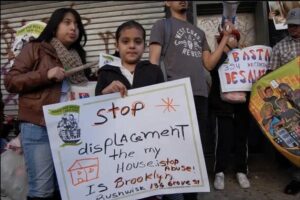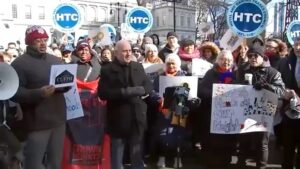By Tony Lindsay, President, New York Homeowners Alliance Corp.
Intro 948A has nothing to do with tenants or housing stock — it’s a targeted reform to protect private-dwelling homeowners who actually live in their homes from politically driven attacks disguised as “tenant protection.”
New Yorkers deserve facts — not fear-mongering — when it comes to housing policy.
Over the past few months, a handful of well-funded tenant-advocacy groups, including the Hotel and Trades Council (HTC) and their political allies, have launched a misinformation campaign against Intro 948A, the bill that would finally correct New York City’s disastrous ban on short-term rentals in owner-occupied homes.
Their talking points are as predictable as they are false: that the bill would “take housing off the market,” “hurt tenants” and “raise rents.”
None of that is true — and they know it.
What Intro 948A Actually Does
Intro 948A is not a tenant-rights bill. It has nothing to do with housing stock.
It is a narrow, common-sense measure designed to give private dwelling homeowners who actually live in their homes limited flexibility to rent their space on a short-term basis when they are present or temporarily away.
It preserves every tenant protection already in law. It does not allow the conversion of rental buildings into hotels. It does not touch rent-stabilized or rent-controlled units.
It simply acknowledges that small homeowners — many of whom are Black, Brown, immigrant and middle-class New Yorkers — should not be criminalized for using their property responsibly to offset rising taxes, utilities and insurance.
These are the everyday families who have invested everything into their homes:the nurse in Canarsie, the sanitation worker in Queens, the immigrant couple in the Bronx — all struggling to stay afloat in a city that seems determined to push them out.
The Manufactured “Tenant” Narrative
HTC and its partners have tried to conflate Intro 948A with large-scale commercial operators who once abused online platforms.
That’s a deliberate tactic to confuse the public.
The current short-term rental law already bans those abuses — what it now bans in addition are everyday New Yorkers trying to survive in their own homes.
As Kathryn Wylde correctly wrote in the Daily News, short-term rental income is a “common-sense way to allow moderate-income homeowners to survive here.”
Yet the same activists who claim to champion affordability are opposing the very tool that helps prevent foreclosure and displacement.
If anything, Local Law 18 — the legislation that Intro 948A seeks to fix — has shrunk the city’s housing options by forcing families to remove rooms and accessory units from use, eliminating thousands of safe, regulated, taxpaying accommodations.
That’s not protection — that’s policy sabotage.
The Economic Irony
There’s also a staggering irony that often goes unmentioned.
Short-term rentals in private homes don’t just help homeowners — they help the city’s economy. They expand tourism capacity in the outer boroughs, bringing more visitors into neighborhoods that typically see little tourism revenue, while the spending from those stays still flows into Manhattan, where most tourism dollars are ultimately spent.
Families and middle-income travelers — the kinds of tourists who can’t afford two or three hotel rooms in Midtown — often rely on home-style stays to experience New York affordably.By restricting those options, the city has cut off a major revenue stream and made New York less accessible to family travelers at a time when tourism revenue has already declined.
In short, opposing reform to Local Law 18 doesn’t protect affordability. It undermines one of the few sources of sustainable economic growth for the city — including the local economies of the outer boroughs, where visiting families spend their money in neighborhood restaurants, shops and small businesses.
Follow the Money and the Motives
Let’s be clear: HTC doesn’t speak for tenants; it speaks for itself.
Its financial interest lies in protecting the hotel industry, not affordable housing.
By choking off home-based short-term rentals, they eliminate competition for hotel rooms — keeping nightly rates high and union revenue flowing.
The political class enabling this — from self-styled “socialists” to opportunistic council members — are not protecting tenants either.
They’re weaponizing the tenant narrative to consolidate power, vilify homeowners and justify ever-greater government control over private property.
The Disconnect in City Hall
Many constituents of City Council members, particularly small homeowners and property owners of color, have voiced growing frustration over their elected representatives’ unwillingness to acknowledge the facts about Intro 948A and, in some cases, to even meet to discuss it.
No matter how clearly they explain that the bill has nothing to do with tenants’ rights, housing stock or long-term rentals, several council members continue to ignore these realities and instead double down on the false narrative promoted by HTC.
This is a troubling sign of how disconnected City Hall has become from the people it claims to serve.
This persistent refusal to engage in good faith raises serious questions about the motives behind such opposition.
If council members are willing to disregard the testimony of the very homeowners who live in their districts — the working- and middle-class New Yorkers they were elected to represent — it suggests that their loyalties may lie more with political donors and special-interest groups than with their own constituents.
Homeowners Are Not the Enemy
Intro 948A protects the smallest, most vulnerable property owners — the people who actually live in their homes.
These are not real-estate speculators or corporate landlords.
They are working-class New Yorkers, many of them Black, Latino, Caribbean, African and immigrant families who poured their life savings into their homes and now find themselves under siege from policies that favor large institutions over individuals.
Opposing this bill under the banner of “tenant protection” is not only dishonest; it’s cruel.
Because when small homeowners are forced to sell, their properties don’t become affordable housing — they’re snapped up by developers and absentee investors.
The result? More luxury condos, fewer family homes and another blow to the city’s working and middle class.
A Common-Sense Path Forward
Intro 948A doesn’t weaken housing policy; it restores fairness.
It enforces safety standards, limits occupancy and ensures that private dwelling homeowners who live on-site can legally share their homes without fear of crushing fines or surveillance-state tactics from the Office of Special Enforcement.
That’s not deregulation; that’s balance.
That’s how you keep communities stable, taxes paid and roofs over real New Yorkers’ heads.
Conclusion
The smear campaign against Intro 948A reveals more about its opponents than the bill itself.Their fear isn’t that it will “hurt tenants” — it’s that it will prove the city can protect both tenants and homeowners without expanding government power or special-interest influence.
The truth is simple: Intro 948A protects people, not profits.
And no amount of political theater should be allowed to bury that fact.



